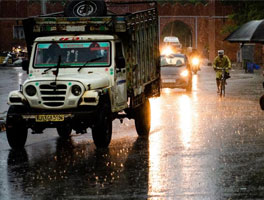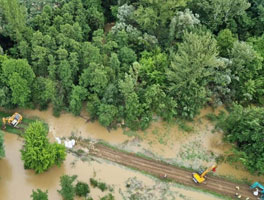 |
Dear readers,
Welcome to the Climate Weekly newsletter by the Centre for Science and Environment’s Climate Change programme and Down to Earth.
We have a sense that climate impacts tend to supercharge existing inequalities and vulnerabilities. Today we look at macrofinance – in particular, sovereign credit ratings, assigned to countries to assess their creditworthiness. A country’s credit rating determines what interest rates a government must pay for loans; it also affects corporate and household interest rates within the country.
Shagun Kapil of DTE writes this week about new research that climate change could lower the credit ratings of 59 countries, including India. Economists at the University of East Anglia and the University of Cambridge used artificial intelligence to simulate the economic effects of climate change on Standard and Poor’s (S&P) ratings for 108 countries over the next 10, 30 and 50 years and by the end of the century. The results showed that many national economies can expect downgrades unless action is taken to reduce emissions.
While there is more such emerging research that climate change affects a country’s creditworthiness, the system of ratings itself is potentially unjust, and limits a country’s ability to invest more in climate mitigation and adaptation – thereby leading to a credit rating trap. A June 2023 paper Beyond Climate Finance by CSE’s Climate Change programme, highlights how country credit ratings are determined by three main private agencies—S&P, Moody’s and Fitch. According to the UN’s Department of Economic and Social Affairs, they face little competition and thereby wield a lot of power. In our CSE paper, we discuss how sovereign ratings involve more subjectivity than corporate credit ratings because political risks and 'willingness to pay' are critical to sovereign credit analysis. The UNDP finds that if ratings for 13 African nations were less subjective and based 'more closely on economic fundamentals' they could access an additional US$ 31 billion in new financing and save nearly US$ 2.2 billion annually in total interest costs. This could open up more money to invest in climate action in these countries.
Elsewhere, the El Nino phenomenon has had a greater impact on the northern parts of India, according to a new paper. Apple production in Himachal Pradesh is likely to fall by more than 50% this year, due to extreme weather. And India’s Ministry of New and Renewable Energy is being urged to explore the feasibility of commercial generation of tidal power.
|
|
 |
| |
 |
|
| |
 |
 |
| |
By - Avantika Goswami
Climate Change, CSE
|
| |
|
 |
|
|
| |
 |
|
| |
| EXTREME WEATHER TRACKER |
| |
ENSO has affected various parts of India separately in recent decades, says new report; here is how, 10 August 2023
|
 |
 |
|
|
| |
 |
|
| |
 |
 |
Slovenia floods: Damage caused by ‘worst-ever natural disaster’ due to poor spatial planning, research shows, 07 August 2023
|
|
|
| |
|
|
| |
|
|
| |
 |
|
| |
|
|
| |
|
|
| |
|
|
| |
 |
|
| |
|
|
| |
 |
|
| |
CLIMATE NEWS | SCIENCE| IMPACTS| POLITICS |
|
| |
 |
|
| |
|
|
| |
 |
|
| |
|
|
| |
 |
|
| |
|
|
| |
 |
|
| |
|
|
| |
 |
|
| |
|
|
| |
 |
|
| |
|
|
| |
 |
|
| |
|
|
| |
 |
|
| |
|
|
| |
 |
|
| |
|
|
| |
 |
|
| |
|
|
| |
 |
|
| |
|
|
| |
 |
|
| |
| Simply Put: Outdated design |
| |
|
|
|
|
|
|
| |
|
|